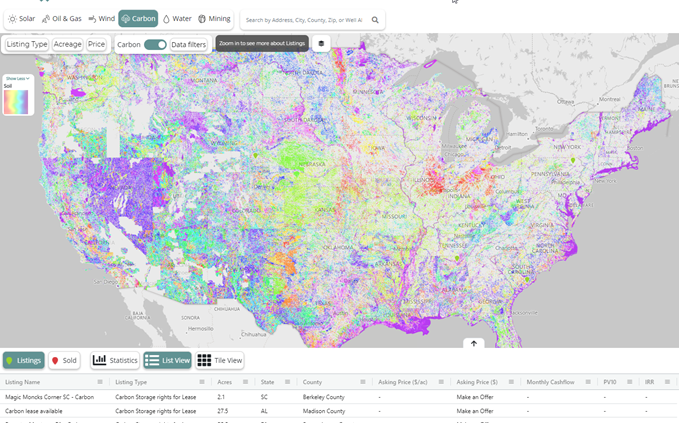Helpful COVID-19 Resources And Information For Land REALTORS®
The National Association of REALTORS® and its NAR Commercial Affiliates, including RLI, have been compiling helpful information and resources for REALTORS®. This page features highlights of the various programs and resources available to real estate agents impacted by the COVID-19 outbreak. We will do our best to keep this page updated with any additional resources that may be of value to our members and the industry.
NAR Blog Post on COVID-19 Relief Package Passed December 2020
This blog post from December 21, 2020 provides an overview of what’s inside the year-end relief package passed by Congress, including impacts on the real estate industry at large. Read here.
RLI Voices Of Land Podcast Episodes Related to COVID-19 and The Land Market
The new ‘The Voices Of Land RLI Podcast’, presented by the LANDU Education Program, featuring Accredited Land Consultant (ALC) host Justin Osborn just released two episodes for land agents discussing the impacts of COVID-19 on land real estate markets. The Voices of Land RLI Podcast recently released two episodes on the topic, the first being with guest Russell Riggs, NAR Legislative Policy Liaison for RLI, discussing What Land Agents Need To Know About The COVID-19 Stimulus Package; and another with guest KC Conway, CCIM Chief Economist, on The Economic Impact of COVID-19 on the Land Market. Listen now.
Virtual Round Table: COVID-19 Impacts On The Land Market
The REALTORS® Land Institute 2020 Future Leaders Committee presents a panel of Accredited Land Consultant (ALC) land experts from across the country in various different land markets to shed light on the impacts of the Coronavirus (COVID-19) outbreak on land values and land market trends.
We’ve also captured the highlights from this recording for each land segment in a series of posts on the RLI Blog:
- Are Buyers Moving To Recreational Land In The Age Of COVID-19?
- COVID-19 Impacts on Agricultural Tillable Farmland
- What Ranchers Need To Know About COVID-19’s Impacts on The Ranch Land Market
- COVID-19 Impacts on Commercial Development Land
- COVID-19 Impacts on Timberland
- COVID-19 Impacts on Rural Residential Hobby Farms
Webinar: COVID-19 Impacts On The Residential Land Market
The housing market entered 2020 with momentum as home-buyers were enthusiastic about low mortgage rates and the multifamily market continued its expansion. The sudden shock brought on by COVID-19 is impacting the housing market and wider economy as uncertainty and layoffs defer decision making.
This webinar will:
- Help you build a playbook in real-time to navigate through today’s marketplace.
- Give insights into the current outlook from home builders for land transactions.
- Showcase on-the-ground experiences with pushing forward entitlements in today’s market.
Watch the recording to get pertinent information from Senior Managing Principal Tim Sullivan and Chief Economist Ali Wolf of Meyers Research in this RLI Hot Topic Webinar from Tuesday, April 28. Hear updates on this topic from our presenters during their company’s weekly webinars.
NAR’s ‘Right Tools, Right Now’ Program
NAR’s ‘Right Tools, Right Now‘ initiative makes numerous valuable resources available to the association’s 1.4 million members at reduced or no cost.
Members TeleHealth
Members TeleHealth, part of NAR’s ‘Right Tools, Right Now’ initiative, provides around-the-clock access to non-emergency healthcare from more than 2,300 board-certified U.S. physicians. Common issues addressed through telemedicine include allergies, asthma, rashes, joint aches, flu and nausea, among others. Beginning April 2, NAR is funding two months of services for members who currently lack access to telemedicine and enroll in this program by April 15. Recognizing that the opportunity will likely draw significant interest from its members, NAR has also negotiated a discounted rate for those who wish to retain coverage following the two month, no-cost period.
“As we continue to solicit input from our members regarding COVID-19’s impact on their lives and businesses, NAR is grateful to be able to offer expanded access to potentially lifesaving telemedicine services,” said NAR President Vince Malta, broker at Malta & Co., Inc., in San Francisco, CA. “Medical professionals are urging Americans who are sick to stay home, and telemedicine is playing a critical role protecting our communities and our health care workers. We continue to encourage members to limit their exposure and decrease the chance of spreading illnesses to others.” Learn more about this Members TeleHealth.
Coronavirus SBA CARES Act
NAR’s Federal Advocacy team has been working closely with Congress and the Administration to ensure the interests of REALTORS® and their clients are protected in any federal action in response to COVID-19. Many REALTORS® are small businesses, or work with them as clients. In the most recent relief package passed into law, the “Coronavirus Aid, Relief, and Economic Security Act” or CARES Act, there were significant provisions aimed at assisting small businesses during this difficult time. The CARES Act appropriates more than $360 billion total for new Small Business Administration (SBA) programs – the 7(a) Paycheck Protection Program loans and the Economic Injury Disaster Loans (EIDL) advance grants program. View FAQs and learn more from NAR.
Congress Clears Coronavirus Relief Bill
6/17/2020 The Small Business Administration and U.S. Treasury Department on Wednesday rolled out major updates to the Paycheck Protection Program, offering automatic forgiveness for certain independent contractors and creating a broader application form for forgiveness. Read more.
4/23/2020 The U.S. House passed legislation Thursday providing a fresh round of funding for coronavirus small-business relief programs championed by the National Association of REALTORS® and available to REALTORS® through the CARES Act. The Senate passed the bill on Tuesday.
President Trump is expected to sign the measure, which will clear the way for lending to resume as early as Friday under two Small Business Administration programs, the Paycheck Protection Program (PPP) and the Economic Injury Disaster Loan (EIDL) Program.
Under the agreement, the PPP will receive $310 billion in new cash, while the EIDL fund will receive an additional $60 billion. The bill sets aside $60 billion of the PPP funding for small and medium-sized community banks, which will provide extra help for self-employed individuals and small businesses that don’t have relationships with larger banks.
“The PPP and EIDL had tremendous demand. Although the rollout was rocky, this latest bill should provide enough funds for everyone who needs a loan to get it. REALTORS® still waiting should contact their lender again and keep trying,” says Shannon McGahn, senior vice president of advocacy for NAR. “We have a wealth of resources to help you through the process, including a new video just posted last night.”
The bill also includes $25 billion for coronavirus testing and $75 billion for hospitals.
Quick Guidance for REALTORS® on the PPP and EIDL From NAR
- If you’ve already applied for an EIDL: The SBA is processing applications already in their system on a first-come, first-served basis. You do not need to reapply.
- If you have not already applied for an EIDL: Check back at the SBA application page once the additional funding is signed into law.
- If you’ve already applied for a PPP loan through an SBA lender but have not been approved yet: Check with your lender to see if they are maintaining a queue of applications during the lapse or if you will need to reapply when the renewed funding comes through.
If you have not applied yet for a PPP loan through an SBA lender: Have the application form filled out and your documentation ready to provide to your lender. (For businesses with employees, have payroll documentation; for independent contractors, have your 2019 Form 1040, Schedule C, and 1099-MISC.) If you have an existing relationship with an SBA lender, you should go to that lender first once the program reopens, but be prepared to try multiple lenders, which you can find on the SBA site.
Additional Resources
- Senate Passes Deal to Replenish Coronavirus Relief Funding (4/21/2020)
- What’s in the CARES Act for Food and Agriculture? (3/26/2020)
NAR Commercial: Webinar – Insights For Commercial Executives
his webinar from April 15, 2020, covers the latest news on legislation and SBA loan programs, key transactional guidance from NAR’s legal team, and insights from commercial real estate executives on their experiences working through today’s volatility and how they are helping clients navigate changing opportunities in the coming months. Watch recording.
CCIM: Coronavirus (COVID-19) Resources and Guidance For Commercial Agents
CCIM Institute has prepared a resource page for commercial real estate professionals to provide additional professional guidance around Coronavirus (COVID-19). This page hosts information about FEMA extensions, Tax Extensions, and updates on other legislative advocacy issues.
SIOR: COVID-19 and CRE: What You Should Know
As CRE leaders around the globe, you are feeling the impact of COVID-19. SIOR has provided a collection of resources available to you to keep you up-to-date on latest news and industry impacts.
IREM: COVID-19 Resources and Information for Property Managers
If you are a property manager, this page from IREM is filled with resources for dealing with the impacts of COVID-19.
Diving into Water Rights: A Primer for Land Agents
“Water is the ultimate zero-sum game; the volume of water used by one right holder sourced from our common pool of water ultimately diminishes, to some degree or other, the volume of water available to other water right holders.”
– Dr. Charles Porter, 2014
Nothing is more basic to successful human congregate settlement than the management and sharing of freshwater resources; the way in which Americans manage their freshwater resources defines the overall quality of life. Today’s REALTORS® must gain a working knowledge of water rights in their geographic area of practice.
Who Owns the Water?
The first question that arises – who owns water in the United States, the public or the individual citizen? The answer is an eternal favorite – it depends – on the geological container in which the water resides. Ownership of water varies from state to state but is always categorized in three geological containers in which water resides, surface water, diffused surface water, and groundwater.
Surface water is water that exists naturally in a river, creek, or stream. Most states own their surface water and describe it as water in a “watercourse” that is generally defined as:
…a channel, comprising well-defined bed and banks, a current of water, and a permanent source of supply. The flow of water need not be continuous, and the channel may be dry for long periods of time.
There are two state-by-state variations of surface water rights in the United States, riparian rights and appropriative rights. Riparian water rights are based upon ownership of land appurtenant to surface water; riparian rights tend to be the basic water law in states east of the Mississippi River. Riparian rights are usufructs only, or rights that allow use of the water but not ownership of the water. Appropriative rights are based upon a grant or license from the state to use the water for a certain purpose. Appropriative rights tend to apply to those states west of the Mississippi River. In most western states, appropriative rights are further permitted based upon first-in- time, first-in-right, a concept referred to as prior appropriation.
The United States “Americanized” the traditional English Common law riparian concept in 1826. According to Professor of Law T. E. Lauer the origin of the American riparian doctrine was rendered by a United States District Court in Tyler v. Wilkinson:
The origin of the American riparian doctrine of water use, whereby each owner of land upon the banks of a watercourse has the right to make a reasonable [emphasis added] use of the water, is customarily placed shortly after the year 1825. Traditionally, the creation of the riparian doctrine has been ascribed to two of the greatest early American jurists, Joseph Story and James Kent.
The introduction of the reasonable use idea is the driving concept in the permitting of surface water in most states and in some states, even applies to legal uses of privately owned groundwater. As opined by Jurist James Kent in 1828, the American definition of the reasonable use of water is:
All that the law requires of the party, by or over whose land a stream passes, is, that he should use the water in a reasonable manner, and so as not to destroy, or render useless, or materially diminish, or affect the application of the water by the proprietors below on the stream.
What constitutes a reasonable use of water is regularly a matter of hot debate between up-streamers and down- streamers. The situational aspect of reasonable use is subjective and determined in the eyes of the beholder; the same specific use can be usually be argued for or against easily and credibly. Most states broadly define reasonable use of water as water used for irrigation, municipal, domestic and livestock, and industrial purposes.
“Today’s REALTORS® must understand the human-water interface and the foundational role water plays in the quality of life of their communities.”
The second geological container is “diffused” surface water, or water that runs across the surface of the land either from rainfall, snow melt, condensation, or caused by other atmospheric conditions. Diffused surface water is owned by the private landowner in some states such as Texas, but not so in other states.
Private ownership of diffused surface water ends when the water enters a surface water watercourse or in some states, when it disappears into the ground and becomes groundwater.
The third geological container is groundwater. Groundwater is “water that exists underground in saturated zones beneath the land surface.” Groundwater rights are owned by the public in many states but owned by the private overlying landowner in other states. Private and absolute ownership of groundwater is recognized in Connecticut, Indiana, Louisiana, Maine, Massachusetts, Mississippi, Rhode Island, and Texas.
In other states with no comprehensive groundwater regulations, ownership is ill- defined in their statutes or in their state constitution. Some states may claim to own the groundwater yet allow unlimited withdrawals without any liability to neighbors, making the practical matter of ownership in those states moot. The geological containers of water exist conjunctive in the hydrologic cycle.
Surface water, diffused surface, and groundwater are, have been, or will ultimately be in union with one another. Diffused surface water feeds both surface water and groundwater.
Groundwater feeds surface water both in the underflow and via natural springs. As water flows downhill above or below ground, the containers feed and deplete each other visibly and invisibly. A single molecule of water is like a chameleon as to its ownership, changing legal status as it flows through the hydrologic cycle.
Another fact of water is that it ignores political boundaries. Setting workable public water policy based upon surface political boundaries and not upon the natural boundaries of the water itself is problematic. A shared common pool water existing in several political boundaries risks conflicts between regulatory agencies weakening prudent management of the resource.
Yet another fundamental concept in water rights is ‘beneficial use’ which is generally accepted to be the use of:
… the amount of water which is economically necessary for a purpose authorized by this chapter when reasonable intelligence and reasonable diligence [emphasis added] are used in applying the water to that purpose and shall include conserved water.
A vexing question arises – what is reasonable intelligence and reasonable diligence? Of course, my use of water, and yours likely as well, is always based on reasonable intelligence and reasonable diligence, right? Beneficial use varies from state to state, clearly defined in some but loosely defined in others. The California legislature so clearly defined beneficial uses of water that their list is five pages long!
Why Land Agents Should Know Water Rights Basics
Why is it so important that real estate licensees in the United States have a working knowledge of water rights in their practice area? First, land with water is more valuable than land without water. The sales price we recommend to our clients to ask and offer is significantly impacted by water rights and water availability.
Second, it is our duty to assist our clients in determining the characteristics of any given tract they are selling or are interested in buying. We, of course, cannot provide legal advice, engineering advice, or hydrologic advice to our clients unless we hold licenses in those professions. A prudent REALTOR®, though, assists clients in finding the professional help they need.
Third, often overlooked but of high importance to our overall civic duty, is the significance that water has on the fair market value of land and its resulting impact on the ad valorem tax base that is so important to the quality of life of any community. In most of the United States public school education through the 12th grade is the most cherished social value, and most often is funded by ad valorem taxation. Some hospitals and other critical public services derive their funding from ad valorem taxation as well. As the water resources in a rural city are sold or leased to an urban area, now more than ever a battleground of conflict nationwide, the ad valorem tax base in the rural city inevitably declines leading to a decline in public school funding and other public services. This, in turn, creates a downward spiral of quality of life in the community.
Frustratingly, there is no “one size fits all” water law or policy that can be applied to a country with such wide geographic diversity as ours. The federal, state, and local governments all have and/or claim some jurisdiction over water, with policies and jurisdictions that exist in open conflict. The route to understanding water rights is challenging, but essential to the value REALTORS® add to their clients’ transactions.
REALTORS® should begin their search by reviewing their state’s constitution and seeking help from the state and local agencies responsible for water use permitting. Some states have county agriculture extension agents that are a great source for water rights information as well.
Many states such as Texas recently created statutory duties requiring real estate license holders to become “geographically competent” in the region or area in which they work; competence in water rights therefore is now the law. Today’s REALTORS® must understand the human-water interface and the foundational role water plays in the quality of life of their communities.
This article was originally published in the REALTORS® Land Institute Summer 2020 Terra Firma Magazine.
 About the author: Charles Porter, Ph.D. is an award-winning author, speaker, testifying real estate expert in over 600 cases nationwide, and has served in various faculty teaching roles at St. Edward’s University since 2008. In 2016 he earned a Ph.D. in Economics and Business from the Universitat Jaume I in Spain with “Cum Laude” distinction. He is also a well- recognized water rights expert. He was recently appointed to the Education Standards Committee of the Texas Real Estate Commission. If you have any questions related to the content in this article, Charles can be reached at crporter@sbcglobal.net
About the author: Charles Porter, Ph.D. is an award-winning author, speaker, testifying real estate expert in over 600 cases nationwide, and has served in various faculty teaching roles at St. Edward’s University since 2008. In 2016 he earned a Ph.D. in Economics and Business from the Universitat Jaume I in Spain with “Cum Laude” distinction. He is also a well- recognized water rights expert. He was recently appointed to the Education Standards Committee of the Texas Real Estate Commission. If you have any questions related to the content in this article, Charles can be reached at crporter@sbcglobal.net
This article was originally published in the REALTORS® Land Institute Summer 2020 Terra Firma Magazine.
Winning Large Land Listings
Having spent over 40 years in the land business, I am occasionally asked about the biggest change I’ve seen in those four decades. The answer is one we can all be proud of, and it’s an excellent starting point for this article on winning large land listings. It’s the change in the culture of our profession.
With RLI leading the way through offering the ALC Designation, LANDU Education Program, annual National Land Conference as well as regional and state chapter events, the level of knowledge and expertise of the average land professional has improved dramatically.
The expansion of knowledge and expertise have allowed us to keep pace with rising seller expectations. As land prices have increased, sellers have become increasingly particular in the process they use to select a listing agent. It’s assumed the agent will have the level of skill and knowledge needed. Land education that was once considered optional is now a must.
“Better is not Differentiation” – Shark Tank
A major shift in the thinking of the seller has changed the way we now present ourselves and our services to them. Not long ago a listing presentation was 75% about the agent and their company, and 25% about the seller’s property. Today its 25% about the agent and their company and 75% about the seller’s property. The person who is able to articulate differentiation more clearly will win the listing almost every time. This is especially true for large properties. As the price goes up, the need for differentiation becomes even more important.
As a rule, brokers and agents create differentiation one of two ways. They show value by putting together a strong detailed presentation illustrating how they are different and uniquely equipped to help the seller sell their property, or they cut their commission.
That’s the big picture but each presentation will involve finer points of differentiation, as well, that need to be emphasized or countered. For example, a competitor may have more experience than you, the seller wants to auction and you don’t do auctions, your competitor has the same marketing tools you do and you are not much different in any way. You need to be prepared to address these and other points that will arise.
Experience Helps Win Large Land Listings
Let’s look at experience first. After my presentation for RLI’s Virtual NLC20 event, someone asked “How do you get in front of the seller to present in the first place?” I get that question a lot. Some have the misconception that other REALTORS® are just invited to present. If they are invited, it is only after a lot of hard work. You must consistently communicate your message to those who own the kind of property you want to sell and use every opportunity you have to show that you are relevant in that market. If you are doing that and still being looked over it’s almost always about experience.
This is common, many agents skip an all important step and try to compete for prime listings before they are ready to do so. It sounds odd but the first step in getting large land listings is to get experience. It’s extremely hard to win this type listing until you are proven. So, how do you get experience when sellers won’t list with you because you don’t have experience? You find someone who has experience you can partner with; you borrow their experience.
The truth is you need an experienced partner for the same reason the seller wants experience. There’s a lot more likelihood you will get the property sold. Establish a network of people (RLI is an excellent place to start) you can work with on specific properties. Get a partner for each property type: farms, ranches, recreational, timberland, commercial, etc., and for separate geographical areas. In Texas, for example, selling property in West Texas is different than selling in East Texas so get someone who knows the territory. Often when you cross a state line things change, so having a partner in the state will be helpful. Also look for opportunities to gain experience. Work with other agents in your office on large Listings. Help them gather information and build a package or prepare a listing presentation. If your company does auctions, help show buyers around on inspection day. Your focus should be to do everything you can to add that deal as one you worked on as part of your experience.
Selling someone else’s land listing is a great way to get the credibility to win more listings. Get to know the players in your area, tour their listings when you have the opportunity, know the inventory in your market so you can work with buyers. It doesn’t take many sales at this level to make a big difference in your resume.
Sometimes you will find yourself in a presentation where it appears you are not really much different than some of the others you know you will be presenting against. The level of experience is close to the same, they’ve had some nice sales of similar properties and you have too and you both use almost exactly the same marketing tools. If you know the competitor that well, you probably have an idea how they will present and how you can present differently. If you think they may just show a website or publication, you dig deeper. Know how many visitors the website has or how many subscribers the publication has. Know the kind of followers the source has and why they are the kind of people who might buy the seller’s property. Show examples of properties similar to the seller you’ve sold or that others have sold through that source. If nothing else, prove that you pay more attention to detail and are more thorough that your competitor.
Consider An Auction To Land Large Listings
There is no better example of differentiation than trying to convince a seller to give you a conventional listing when they have a reason they need to sell at auction. That scenario literally defines differentiation. Remember, differentiation is giving the seller something they want that your competitor can’t do for them. While every property is not right for auction, many of the deals that do go to auction are large properties with a motivated seller. When I had my brokerage, the biggest sale in my market almost every year would be an auction. I wanted that business but, even with auctioneers charging a significant upfront marketing fee, I was never able to win a single listing from an auctioneer. The seller simply had needs that could only be met by the auction method. For example, auction allows the seller to choose the day the property will sell.
Auction allows the seller of a prime property to get more than they might have listed it for conventionally because the seller does not have to disclose his asking price first. Auction allows the settlement of ownership dispute or estate liquidations with more transparency. Auction provides a cleaner “as is” sale without contingencies, and auction compresses the marketing period and accelerates the sale time.
“Don’t act like an amateur and expect to be paid like a professional” – Jared James
All those things are extremely difficult, if not impossible, for a conventional broker to do. The only way you can win part of that business is to find a good proven auctioneer to work with and offer auctions yourself. It’s unlikely that you will be able to recruit the kind of auctioneer you will need as an associate. You will probably have to work on a co-op basis, with you finding the auction and bringing them in to help negotiate the contract and do the sale. Experience is extremely important in the auction business. A failed auction can cost you credibility and take years to recover from. Do your homework.
Choose an auctioneer that has a history of success and fair dealing then work hard to hold up your end of the bargain and form a long and lasting partnership.
Nail The Presentation To Land The Listing
All these things should come together in a formal presentation. Remember, your presentation is the seller’s first glance at your work as it relates to their property. It’s hard to spend the time and resources preparing when there is a chance you might not win the listing, but you have to. It’s game day and not a time to hold anything back. Your goal should be to have the most professional presentation the seller is going to see put together in a way that highlights the seller’s property and your differentiation.
By now, I hope it’s evident that winning the best listings is a long-term commitment. It won’t happen by accident. Create a plan with a timeline for getting the training and education you will need to deliver the highest level of service. Form and maintain a strong network of professionals by specialty and geographical area, build an exceptional listing presentation and learn to express your value in terms of how you are different, and how and why that difference will help get the seller’s property sold. Aim for excellence every day. It’s hard work but, in the end it’s well worth it if you’re winning large land listings.
This article was originally published in the REALTORS® Land Institute Summer 2020 Terra Firma Magazine.
 About the author: Richard Thompson began selling land in 1974 and joined the management team of United Country Real Estate where he now serves as Executive Vice President in 1988. He participated in hundreds of land transactions as an agent and broker and assisted with many others nationwide in his current role. His experience includes farming wheat, soybeans, cotton, milo, rice, hay and cattle which helps him connect with a broad range of sellers. His specialty is listing and seller representation.
About the author: Richard Thompson began selling land in 1974 and joined the management team of United Country Real Estate where he now serves as Executive Vice President in 1988. He participated in hundreds of land transactions as an agent and broker and assisted with many others nationwide in his current role. His experience includes farming wheat, soybeans, cotton, milo, rice, hay and cattle which helps him connect with a broad range of sellers. His specialty is listing and seller representation.
The Future Of The Land Brokerage Industry
As nearly all businesses are forced to pivot quickly in order to meet consumer expectations amid the Coronavirus pandemic, a glimpse into the land brokerage industry — which has been evolving rapidly due to technological advancements and changing consumer behavior—is extremely relevant today.
Technology’s Disruption of the Land Brokerage Industry, and the Coronavirus Pandemic Acting as a Catalyst
Prior to COVID-19, technology was already making a noticeable impact on both our businesses and personal lives. Technology has forever changed communication, shopping, banking, education, entertainment, and, recently even how we visit with our doctors. But we didn’t fully understand how suddenly the benefits of technology would shift from being a convenience to an absolute necessity.
Most of the world came to a screeching halt a few months ago. Meanwhile, the innovative, forward-thinking businesses have proven they don’t need to stop their dribble to pivot; they’re going straight to the hoop for the score. Those effectively wielding technology are dominating the marketplace, whether we like it or not.
Before the pandemic, it had been predicted that 40% of both blue- and white-collar jobs would be lost to technology over the next 15 years. Since the onset of COVID-19 and the shutdown of our economy, it’s become clear that loss of American jobs to technology will occur more rapidly than originally predicted. And the real estate sector is no exception.
Long before Coronavirus had become a household name, massive disruption had been going on in the residential real estate sector. Companies effectively leveraging technology, data, google rankings, artificial intelligence, and social media were covering ground faster than Murder Hornets. That’s why we must learn from these residential companies.
They are changing the industry’s message with marketing slogans such as “Real Estate, Made Simple” and “Finally, the Way Real Estate Should Be.” Some of these businesses are demonstrating how the residential real estate industry has been ripe for disruption.
On a related note, businesses in general are seeing consumers demand more transparency. Consumers expect relevant, accurate, free-of-charge data to be at their fingertips to assist them with their decision-making process. If businesses are unable to meet their expectations, they’re on to the next vendor.
“…86% of real estate agents will be replaced by robots over the next 20 years.”
A recent Oxford University study predicted that 86% of real estate agents will be replaced by robots over the next 20 years. This statistic could be scary, but it’s not all doom and gloom. The real question is, will you be part of the 86% pushed aside, or will you be part of the elite 14% who are taking the time to learn how to stand out, stay relevant, and remain valuable? If real estate professionals can better serve clients by providing exactly what they need on a personal, emotional, and technological level, while saving them time and money, we become invaluable.
As real estate brokers, our path ahead may not be as easy as it has been in the past, but it’s important to seek opportunity in every challenge; do not sit victim to the changing circumstances. Be coachable and seek mentoring from others who can provide valuable tools and insight into changes and updates in the land brokerage industry.
As consumers take the lead in communicating what they want from land brokers, it’s important to go above and beyond to protect our brands and reputations, at all costs. Take caution: enabled by tools like Yelp, Google, and Facebook reviews, the service industry is being placed under a microscope more than ever before. Consumers will have access to how well or insufficiently we’ve performed, and they’ll base their buying decision on that information, and for many of them, that information alone.
The Bottom Line
There is no way to slow the pace of technology. We must embrace the impact it’s making in every industry, especially in new ways of connecting and presenting valuable information to our consumers in the land brokerage industry.
They are the ultimate shot caller, deciding who wins and who loses. Only those companies that can reach and provide the best consumer experience will win. Participation trophies in the land brokerage business are a relic of the past.
This article was originally published in the REALTORS® Land Institute Summer 2020 Terra Firma Magazine.
 About the author: Aaron Graham, ALC, is Partner and Chief Innovation Officer with National Land Realty. He’s a licensed real estate broker in Nebraska, Iowa, and Kansas. Since he entered the real estate business after retiring from a successful NFL career, he’s brokered over $300,000,000 of land transactions throughout the Midwest.
About the author: Aaron Graham, ALC, is Partner and Chief Innovation Officer with National Land Realty. He’s a licensed real estate broker in Nebraska, Iowa, and Kansas. Since he entered the real estate business after retiring from a successful NFL career, he’s brokered over $300,000,000 of land transactions throughout the Midwest.
Getting To The Top: Tips From The Nation’s Top Producing Land Agents
The Realtors® Land Institute is excited to share top advice from the winners of our 2019 APEX Awards Program, sponsored by The Land Report, as the top producing land agents in the country for 2019. The APEX Awards Program is designed to recognize the excellence and performance of the best in the business by distinguishing agents with these prestigious production-based awards.
“To be successful at anything one must become knowledgeable, whether by education, experience or both. At the same time, persevere, be consistent, and exhibit high integrity and a hard work ethic. Excellence in all facets of your profession. And also, successful people know that ‘no’ is a powerful word and a complete sentence.”
– Andy Flack, ALC, HomeLand Properties, Inc., Huntsville, TX, APEX 2019 Top National Producer and APEX 2019 Broker of the Year in Timberland Sales
“Listen to what your client’s goals are and, once you truly understand them, work your behind off to make them a reality. You are only as good
as your client’s success.”
– Ryan Sampson, ALC, CCIM, Eshenbaugh Land Company, Tampa, FL, APEX 2019 Broker of the Year in Commercial Land Sales

“My best piece of advice is to stay client focused and help them accomplish their goals. In the words of the late Zig Ziglar ‘You will get all you want in life, if you help enough other people get what they want.’ So our job is to really understand our clients’ goals and objectives, and to help them meet those goals and objectives.”
– Dean Saunders, ALC, CCIM, SVN Saunders Ralston Danzler, Lakeland, FL, APEX 2019 Broker of the Year in Ag Land Sales – Ranches
“Collaboration and abundance are two things that are a huge part of our culture at Peoples Company. There is no shortage of opportunities to pursue and, when you open up communication with others in the industry and within your own office, it creates more opportunities for everyone. This recognition is more about the collaborative culture at Peoples Company and a reflection on our team more so than an individual achievement. Most of our auctions have 10 to 15 of my colleagues involved. It’s truly a team effort and wouldn’t be possible without the abundant culture and collaborative efforts at Peoples Company and others in the industry.”
– Steve Bruere, RLI Member, Peoples Company, Clive, IA, APEX 2019 Broker of the Year in Auction Land Sales
“I personally don’t think there is one single piece of advice that I can give. There are several things that need to happen to be successful. The first piece of advice, is to learn everything you can learn about real estate, learning is a never ending process. The more you learn the better you get! Persistence definitely pays off! Don’t give up! Concentrate on building long term relationships. You have to be useful, by providing information, a product, or a service. I can’t tell you how many times property deals have come back to me. Last, always be honest! If you don’t know, tell the client you don’t know, but you will get back to him with an answer as soon as possible! These are the things that have worked for me. I hope this advice helps you!”
– Marty Domres, ALC, CCIM, Domres Real Estate Investments, Inc., APEX 2019 Broker of the Year in Residential Land Sales
“Helping buyers and sellers acquire and sell farmland continues to be a people business. Buyers and sellers rely on their Land Broker to be their Trusted Advisor. We do this by providing professional services above and beyond what is asked. This is done by treating people with integrity and honesty. Also, by keeping up to date with what is going on in the land market and by communicating it with your clients at all times. Making this a top priority builds lifelong relationships. If you do these things, everything else will fall into place.”
– Troy Louwagie, ALC, Hertz Real Estate Services, Mt. Vernon, IA, APEX 2019 Broker of the Year in Ag Land Sales – Crops and APEX 2019 Wrangler
“I know this advice may sound very basic, but sometimes the basic things are the best things! It is this: always put the interests of your client before your own. As brokers, we have so many different ways we can handle our business – some ways are good, some are bad. Usually the simplest way for me to stay on the right track is to do my business with integrity, and then simply put my clients’ interests first. When a broker learns to do this well, that is, when they are really building a career they can be proud of, instead of just closing one sale.”
– Joey Bellington, RLI Member, Whitetail Properties, San Antonio, TX, APEX 2019 Broker of the Year in Recreational Land Sales
The RLI APEX Awards Program, sponsored by The Land Report, celebrated its third year with a record 105 applicants totaling a combined $2.65+ billion in qualifying transaction volume and 3,535 sides represented. All land professionals recognized as part of the RLI APEX Awards Program are active members of RLI. The 2019 APEX Top Twenty Award winners were ranked by qualifying production volume. For more information on the award winners, make sure to get a copy of The Land Report, one of the industry’s leading magazines for landowners and land professionals, which will publicize the top winners in their upcoming Spring 2020 issue. All land real estate professionals are invited to join RLI and apply to the prestigious APEX Awards Program next year. Learn more at https://www.nationallandconference.com/national-land-conference/rli-apex-awards-program
This article was originally published in the REALTORS® Land Institute Summer 2020 Terra Firma Magazine.
Property Ownership: A Bedrock of the Economy in Troubled Times
It’s been a rough few months for the economy, and we could all use a little good news. For America’s millions of home and property owners, here is some: While retirement accounts and the stock market may have cratered, property values are hanging tough.
The National Association of REALTORS® (NAR) reported in May that the median existing-home price for all housing types was up 8%. And with a proper recovery and the right policies, there is a great chance that home values will remain fairly stable even as home sales temporarily fall while Americans shelter-in-place.
The pandemic also hasn’t stopped business activity outright like in many other sectors. A recent NAR survey of members found that one-quarter of REALTORS® had at least one client go under contract during the second week of April without physically seeing the property. Deals are proceeding with the growing use of new technology like remote notarization. Even those pausing their real estate transactions still plan to buy and sell once again within a few months.
Property ownership is turning into a financial pillar for many Americans during this crisis, and in a surprising show of alacrity and bipartisanship, Congress went to great strides to help protect that investment. For those who can no longer pay their mortgage, new mortgage forbearance rules allowed them to put off payments for up to a year without impacting their credit. Other new benefits like forgivable small business loans and unemployment assistance not normally available to the self- employed or independent contractors are helping them weather the storm. Congress deserves credit for responding in a bipartisan and lightning-fast way even if the roll-out of those programs was less than perfect.
If real estate is still viable, land real estate may be in an even better position to take advantage of changing social trends and shifting demographics. Increased time inside close quarters during the Coronavirus pandemic is causing some urbanites to consider moving toward the suburbs and even further, a recent survey shows. A survey from the Harris poll showed that nearly 40% of U.S. adults living in urban areas indicated they would consider moving “out of populated areas and toward rural areas,” compared to 29% of overall respondents. Anecdotal evidence from agents in Seattle and along the West Coast indicates that smaller cities in the region like Boise, ID, are becoming increasingly attractive. This demographic movement could encompass the development of new communities that cater to telecommuters and to new resort developments.
Developers will be searching for land that will enable them to build properties that enhance “community” but also cater to a buyer’s desire to spread out. Virtual tours of neighborhoods, homes, and land are among the new tools that are helping to facilitate the interest.
Of course, the pandemic may also create unknown economic dynamics that could negatively impact land and real estate markets in the future. Fears of COVID-19 could exacerbate the trend towards online commerce and away from greenfield brick and mortar developments. This could reduce the demand for large, new commercial developments.
There could also be severe long-term impacts on the agricultural sector. As we see growing levels of concern, recommendations for social distancing, reduced travel, avoiding crowds, and other protective practices to slow the spread of COVID-19, consumers will be making tough choices about food, eating away from home, and overall spending. This will likely have an impact on markets and prices. Concerns about the impact of the virus on the broader economy may have an even larger impact on dairy prices. Many countries of the European Union were already hovering just above a recession prior to the viral outbreak and this event is likely to push them over the edge.
“…it has never been clearer that property ownership is still one of the best and safest investments an American family can make.”
As supply chains and logistics are disrupted, the agricultural sector will continue to be impacted. We have already seen livestock euthanized and crops plowed under because of the inability to get these commodities to market. All of these trends could disrupt the farm economy for the long-term.
Despite the possible adverse impacts on land real estate markets, it has never been clearer that property ownership is still one of the best and safest investments an American family can make. Economic downturns and public health crises—no matter how severe— will never change this fundamental fact. But what has become even more apparent is that, during this crisis, home has become more important than ever.
This article was originally published in the REALTORS® Land Institute Summer 2020 Terra Firma Magazine.
 About the author: Russell Riggs, in his position with the National Association of REALTORS®, serves as the REALTORS® Land Institute Government Affairs Legislative Liaison in Washington, D.C., conducting advocacy on a variety of federal issues related to land.
About the author: Russell Riggs, in his position with the National Association of REALTORS®, serves as the REALTORS® Land Institute Government Affairs Legislative Liaison in Washington, D.C., conducting advocacy on a variety of federal issues related to land.

























